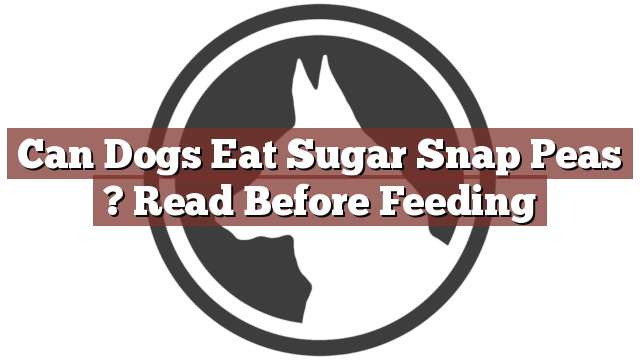Understanding Your Dog’s Dietary Needs
As a responsible dog owner, it is essential to understand your furry friend’s dietary needs. Providing a balanced and nutritious diet is crucial for their overall well-being and longevity. While dogs are omnivores, not all human foods are safe for them to consume. Therefore, it is important to research and be aware of what foods are suitable for your dog’s consumption.
Can Dogs Eat Sugar Snap Peas? Read Before Feeding
Can dogs eat sugar snap peas? This is a common question among dog owners who are looking to include healthy vegetables in their pet’s diet. The answer is yes, dogs can eat sugar snap peas in moderation. These crisp and tasty vegetables are packed with vitamins and minerals that can be beneficial for your dog’s health. However, it is crucial to introduce them gradually and in appropriate quantities.
Sugar snap peas are a good source of fiber, vitamin C, vitamin K, and manganese, all of which can contribute to your dog’s overall health. The fiber content in sugar snap peas can aid in digestion and promote regular bowel movements. Vitamin C is an antioxidant that helps boost the immune system, while vitamin K supports proper blood clotting. Manganese is important for healthy bone development and metabolism.
Pros and Cons of Feeding Sugar Snap Peas to Dogs
Feeding sugar snap peas to your dog offers several benefits, but it is important to consider both the pros and cons before incorporating them into their diet.
Pros: Sugar snap peas are low in calories, making them a great choice for dogs on a weight management program. They can also provide a crunchy texture and refreshing taste, which many dogs enjoy. Moreover, the vitamins and minerals in sugar snap peas can contribute to your dog’s overall health.
Cons: While sugar snap peas are generally safe for dogs, there are a few precautions to keep in mind. Some dogs may have difficulty digesting raw vegetables, leading to gastrointestinal upset. Therefore, it is advisable to cook or steam the sugar snap peas before feeding them to your dog. Additionally, always remember to remove the tough strings running along the sides of the peas, as they can be difficult to chew and potentially pose a choking hazard.
Conclusion: Considerations for Feeding Sugar Snap Peas to Your Dog
In conclusion, sugar snap peas can be a healthy addition to your dog’s diet when fed in moderation. They offer a range of vitamins and minerals that can support your dog’s overall health. However, it is important to introduce them gradually, cook or steam them to aid digestion, and remove any tough strings that may pose a choking risk. As with any new food, monitor your dog for any adverse reactions and consult with your veterinarian if you have any concerns. By understanding your dog’s dietary needs and making informed choices, you can ensure they lead a happy and healthy life.
Thank you for taking the time to read through our exploration of [page_title]. As every dog lover knows, our furry friends have unique dietary needs and responses, often varying from one canine to another. This is why it's paramount to approach any changes in their diet with caution and knowledge.
Before introducing any new treats or making alterations to your dog's diet based on our insights, it's crucial to consult with a veterinarian about [page_title]. Their expertise ensures that the choices you make are well-suited to your particular pet's health and well-being.
Even seemingly harmless foods can sometimes lead to allergic reactions or digestive issues, which is why monitoring your dog after introducing any new food item is essential.
The content provided here on [page_title] is crafted with care, thorough research, and a genuine love for dogs. Nevertheless, it serves as a general guideline and should not be considered a substitute for professional veterinary advice.
Always prioritize the expert insights of your veterinarian, and remember that the health and happiness of your furry companion come first.
May your journey with your pet continue to be filled with joy, love, and safe culinary adventures. Happy reading, and even happier snacking for your canine friend!

